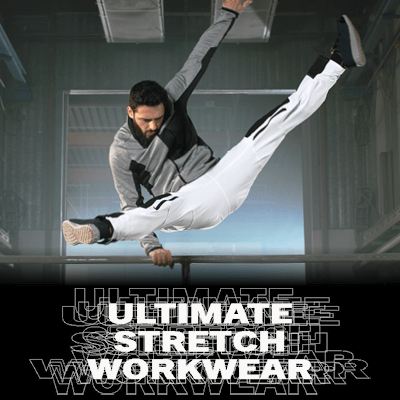Transport and packaging with consideration
The journey from cotton plantation to factory floor is long and typically stretches across several continents. The cotton needs to be spun, woven and dyed before being sent to the production site, where it is sown into clothing. And there are a number of different components that need to be brought together when producing a product such as a pair of trousers.
Producing a very durable pair of trousers often requires between six to eight different types of fabric in addition to various different types of buttons, zippers, threads, buckles, ID card holders and logos. Quality, price, expertise and supply often mean that these components come from a range of different suppliers all over the world.
Transport of raw materials
At MASCOT, our production sites are well situated from a logistics point of view, and this provides a number of benefits: When it comes to the purchase of accessory materials, such as zippers and buttons, MASCOT's position as one of the biggest players on the market means that we are able to buy large quantities at a time, thus eliminating the need to separately transport lots of smaller orders. Moreover, our production site and raw material store in Vietnam is centrally located in relation to a large number of suppliers. This means that the various different components don't have far to travel in the first instance.
Transport of final products
Once the workwear is finished at our own factories, it is then transported in forty-foot containers by ship to Denmark, where it is put into storage at our highly automated high-bay storage warehouse. From here, the products are sent onwards to customers all over Europe. In other words, your MASCOT workwear has travelled a great many kilometres by the time it finally makes its way to you. That is why we here at MASCOT always choose to use quality assured and trustworthy partners when it comes to the suppliers of our transport services. All of our primary transport suppliers have implemented ISO 14001. ISO 14001 is a global standard and one of the most well-regarded systems for environmental management. It is a management tool that helps us to structure how we handle our environmental impacts, reduce our consumption of resources and provide our management team with an overview of the whole company's environmental performance.
Global partners
Each year, we transport several hundred containers by sea freight. This takes its toll on the environment, which is why we here at MASCOT have chosen to collaborate exclusively with large, global shipping companies which are in the process of changing and rebuilding their ships from ones that use diesel motors to alternatives that use LNG (liquified natural gas). It will take around a decade or so before this change is fully implemented. Ocean-going container ships also use much less CO2 per transported product compared with air freight. Modern ships have a more streamlined design which reduces fuel consumption and thereby brings down CO2 emissions as well.
Recycled packaging
Each day, thousands of products are produced at MASCOT's factories in Vietnam and Laos. They are all packed in boxes that are made exclusively from recycled pulp. And they are filled to the max so as to avoid "transported air" in the containers which would increase CO2 emissions on the journey to Europe. When the boxes arrive at our central warehouse in Denmark, so long as they are still in good condition (they are made from a very strong material), they are reused for the shipment of orders onwards to customers. They do take a beating from time to time, though, so orders to customers are sometimes sent in new cardboard boxes as well. These boxes are made from 80 percent recycled materials. They are a little more lightweight and come in different sizes, so we can once more avoid sending air to the customers: Each finished and packed box goes through a fully automated process. This involves all of the goods being pressed lightly together and measuring how much space they take up. After this, the surplus height is cut off the top of the box so that the total height matches the contents inside. This helps make sure that the box takes up the least amount of space possible on the pallet when the goods are in transit. It also means that we can avoid transporting empty spaces of air and thereby avoid unnecessary CO2 emissions. The boxes also have a simple opening system which, if used correctly, means that they can then be reused again by customers.
Plastic bags made from recycled materials
MASCOT workwear is packaged in plastic bags for logistical reasons and in order to protect the products during transit. We have begun using plastic bags made from recycled plastic collected in Bangladesh for a selection of our products. This allows us to transform an old resource into a new one that can be used again. See how the process works in our video:
At MASCOT, we generally try to use as much recycled material as possible in our packaging. Even plastic bags, which are used for smaller orders from MASCOT's warehouses, are made from 100% recycled plastic materials. The size of each order is assessed, and suitable orders are dispatched in black shipping bags whenever possible. With regards to cardboard boxes used for bigger orders, the bulk of the content inside is always made from recycled materials.
At MASCOT, we are constantly in close contact with existing suppliers and potential suppliers. We are constantly seeking out new opportunities to adopt new measures and find more environmentally friendly solutions both with regards to transport and packaging.





















